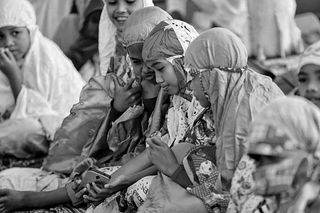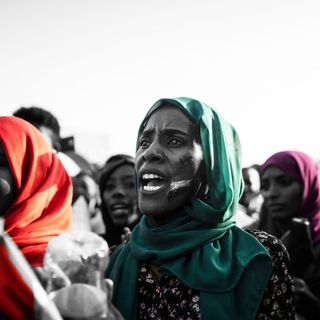
Child Marriage Survivor Pushes Islamic Clerics into Signing Historic Fatwa
The fatwa rules that all Sunni marriages should be based on mutual consent, “especially the young woman’s.”

In a first, Dr. Saleh Abbas, the deputy Grand Imam of Cairo’s Al-Alzhar University — one of the world’s most revered centres of Sunni Islamic learning — has issued a fatwa(religious decree) against child marriages saying that the “minimum age of maturity” for Muslim girls to marry is 18 and that marriage should be based on the consent of both parties, “particularly the young woman.”
The decree was passed on the last day of the first pan-African summit, Africa4Girls, convened by the governments of Senegal and The Gambia, in partnership with the NGO, Safe Hands for Girls, in Dakar, Senegal in June 2019. The summit’s aim was to initiate trans-national talking across various sectors to end child marriage and female genital mutilation (FGM) in Africa by 2030. The summit was attended by delegates from 17 countries belonging to different sectors, including governments, international organizations like UN Women and United Nations Population Fund (UNFPA), religious leaders like the deputy Grand Imam of Al-Azhar, who is considered an authority figure in Islamic jurisprudence, leaders from other faiths, and young activists and survivors of FGM and child marriage.
The translated text of the fatwa reads: “The age of 18 marks the stage at which a woman can validly express her will to marry. This guarantees that she can enjoy her fundamental rights to childhood, education and the capacity to assume the responsibilities of marriage. Before that age, she will not have had access to those necessary rights and is not able to assume the responsibility of marriage; and God would not impose on His servants an obligation that they cannot fulfill.”
The summit was organized by Jaha Dukureh, a Gambian human rights activist, UN Women’s goodwill ambassador for Africa, founder of Safe Hands for Girls and a survivor of child marriage and FGM. On the morning of the last day of the three-day summit, she was enjoying the fruits of her labor having successfully organized a first-of-its-kind African-led, women-led, survivor-led conference on issues of global importance.
At breakfast, she had an idea, she told NPR: she wanted to formalize the three days of rhetoric and calling-for-action speeches; she wanted a fatwa against child marriage from a delegation of five imams at the conference, including Dr. Abbas. She excused herself from breakfast, found two colleagues — African Union youth envoy Aya Chebbi and Syrian journalist Abdalaziz Alhamza — and scribbled a few points on hotel notepaper. They found the delegation of imams and convinced them a fatwa was the need of the hour. They pushed the conference’s closing ceremony by four hours during which time the imams and the young activists worked together to translate their rough draft from Arabic to English and French. Dr. Abbas then read out the fatwa against child marriage during the closing ceremony of the conference.
“We sat there on the floor with them, writing the fatwa. They had to call Egypt to ensure that everything was in line. And then there was a back-and-forth about languages because, in Arabic, things can be translated [in] different ways. To me, it was just amazing to watch,” Dukureh told The Guardian.
Related on The Swaddle:
Time to Change Approaches to Combating Child Marriage
Fatwas have been issued on these issues before, with Al-Azhar having issued one previously against FGM. But progress on the child marriage front is slow and tenuous. 12 million girls are married in childhoodacross the world every year. 39% of young women in sub-Saharan Africa are married before they turn 18; 13% are married before 15.
“[My father and I eventually] came to a point of agreement when it comes to FGM. We never had a resolution on child marriage. Even my brothers, they would always tell me, you know, you can talk about FGM all you want. But with child marriage, you can’t touch it because the Prophet’s wife was nine when he married her. So don’t even go there,” Dukureh told The Guardian, explaining how deeply rooted the harmful practice is, in Muslims, especially in Africa.
With this in mind, Dukureh hoped that a fatwa against child marriage from the deputy grand imam himself against child marriage will carry a lot of weight. As non-binding as a fatwa is, his word is the closest thing to law in the Islamic world.
FGM also occupied center stage as a topic of discussion at the summit. Its negative impacts are borne by 200 million women, and a further 50 million girls are at risk of being forcibly cut globally. FGM still impacts between 15% and 95% of girls in 20 African countries, while change is slow to come in Sudan, Mali, Djibouti, and Sierra Leone.
While India has managed to bring down child marriage by 51% in the last 19 years, there is a continued and hushed prevalence of FGM within the one-million-strong community of Dawoodi Bohras, who belong to the Shia sect of Islam. A small study by WeSpeakOut, a survivor-led movement to end FGM, showed that 75% of respondents in the sample from the Bohra community were cut before or at the age of 7 as a religious obligation. Approximately 33% of the women reported that FGM had negatively affected their sexual life with many reporting painful urination, discomfort, difficulty walking, and bleeding after the procedure. The women also reported long-lasting psychological damage from their experiences; 22% of the women simply had no memory of being cut. Even though the UN General Assembly adopted a unanimous resolution on the elimination of FGM in 2012 and the World Health Organization classifies it as a violation of human rights, India has no law banning the practice.
It can take a leaf from Africa’s book: along with the fatwa, activists, religious leaders and officials and government ministers and heads of state adopted a declaration on African nations completely eradicating both harmful practices by 2030, in line with the UN’s Sustainable Development Goals for gender equality.
Pallavi Prasad is The Swaddle's Features Editor. When she isn't fighting for gender justice and being righteous, you can find her dabbling in street and sports photography, reading philosophy, drowning in green tea, and procrastinating on doing the dishes.
Related


Why We Are Able to Empathize With Some, Never All
